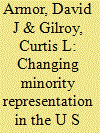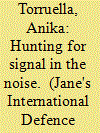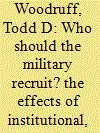|
|
|
Sort Order |
|
|
|
Items / Page
|
|
|
|
|
|
|
| Srl | Item |
| 1 |
ID:
094136


|
|
|
|
|
| Publication |
2010.
|
| Summary/Abstract |
The Department of Defense has always sought a socially representative enlisted force, especially with respect to African American and Hispanic minorities. Ideally, in a democratic society a military force should be representative of the nation it defends. African American overrepresentation was a major concern during the first decade of the All-Volunteer Force (AVF), while Hispanics were underrepresented. During the 1980s black representation stabilized and Hispanics began to increase, especially with respect to enlistments. Starting in the 1990s, black representation began to decline, followed more recently by declines among Hispanics. This article examines changes in minority representation since the inception of the AVF in 1973 and argues that the wars in Afghanistan and Iraq have played a significant role in recent changes.
|
|
|
|
|
|
|
|
|
|
|
|
|
|
|
|
| 2 |
ID:
150171


|
|
|
| 3 |
ID:
106442


|
|
|
|
|
| Publication |
2011.
|
| Summary/Abstract |
What career information do potential military recruits seek? The Internet increasingly provides a medium for advertising and communication with recruiters and other potential recruits. The authors explored the influence of online information on enlistment decision making. Analysis of recent Army new recruit surveys showed that a sizable proportion of recruits have encountered military advertising or sought recruiting information online. The authors also examined online discussion forums-in which soldiers and prospective soldiers ask questions, trade insights, and vent frustrations-for postings indicating information seeking for enlistment decision making. Potential recruits were most interested in recruiting processes and what to expect from a military lifestyle, seeking opinions and details on job functions, duty stations, and benefits. These findings suggest that potential recruits may seek information online when unable or unwilling to find it from military websites or talking to recruiters.
|
|
|
|
|
|
|
|
|
|
|
|
|
|
|
|
| 4 |
ID:
155821


|
|
|
|
|
| Summary/Abstract |
The U.S. military spends millions of dollars and substantial institutional effort to understand enlistment motives and appropriately target incentives, recruiting effort, and marketing to prospective members. Similarly, researchers have worked for decades to identify, understand, and conceptualize enlistment motives. Much less effort has been made to understand the effect enlistment motives/goals have on individuals after they join. This research uses well-established enlistment motives/goals to identify and understand their effects on soldiers’ value to the military in terms of organizational identification and critical discretionary behaviors. Using multicohort cross-sectional data from future, initial training, and currently serving soldiers, this research finds that intrinsic enlistment motives/goals, such as altruistic service and self-enhancement, create greater relational and behavioral value than most extrinsic/economic enlistment motives/goals such as pay, gaining skills for future employment, and educational funding. Intrinsic enlistment motives/goals have a strong positive effect on perceptions of the organization, social satisfaction, organizational identification, and discretionary pro-organizational behaviors. Conversely, economic enlistment goals tend to be associated with higher levels of economic satisfaction but decreased organizational identification and pro-organizational behavior. Importantly, these effects tend to persist among soldiers who have been in the military for years. Contrary to the institutional–occupational framework, self-focused enlistment goals, both intrinsic and extrinsic, can creative substantial value for the military when they are aligned with organizational interests. Based on these findings, the practice of using enlistment motives/goals to maximizing enlistment without considering their long-term impact on relationship quality and behavior appears myopic and may fail to maximize long-term value for the military.
|
|
|
|
|
|
|
|
|
|
|
|
|
|
|
|
| 5 |
ID:
140259


|
|
|
|
|
| Summary/Abstract |
This paper examines how workplace goals affect the quality of worker output, using data from the recruiting command of the US Navy. Recruiting stations and recruiters are assigned monthly goals for the quantity of new recruits that may create an unintended incentive to sacrifice quality, especially towards the end of the month. Using data on the universe of Navy recruits from FY1998 to 2010, we find significant reductions in the quality of recruits towards the end of the contracting month, both in terms of pre-existing quality of recruits and in medium-term outcomes that reflect the quality of the job match.
|
|
|
|
|
|
|
|
|
|
|
|
|
|
|
|
|
|
|
|
|